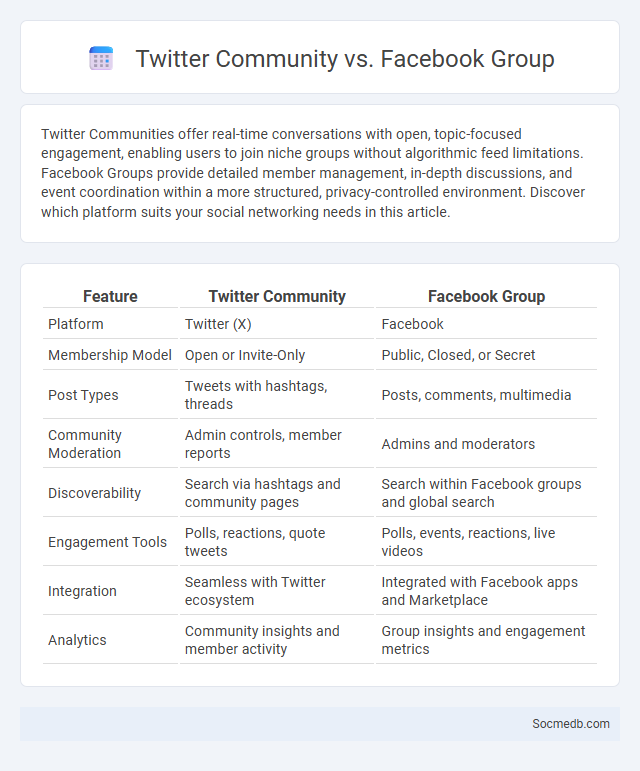
Photo illustration: Twitter Community vs Facebook Group
Twitter Communities offer real-time conversations with open, topic-focused engagement, enabling users to join niche groups without algorithmic feed limitations. Facebook Groups provide detailed member management, in-depth discussions, and event coordination within a more structured, privacy-controlled environment. Discover which platform suits your social networking needs in this article.
Table of Comparison
| Feature | Twitter Community | Facebook Group |
|---|---|---|
| Platform | Twitter (X) | |
| Membership Model | Open or Invite-Only | Public, Closed, or Secret |
| Post Types | Tweets with hashtags, threads | Posts, comments, multimedia |
| Community Moderation | Admin controls, member reports | Admins and moderators |
| Discoverability | Search via hashtags and community pages | Search within Facebook groups and global search |
| Engagement Tools | Polls, reactions, quote tweets | Polls, events, reactions, live videos |
| Integration | Seamless with Twitter ecosystem | Integrated with Facebook apps and Marketplace |
| Analytics | Community insights and member activity | Group insights and engagement metrics |
Introduction to Online Communities
Online communities serve as dynamic platforms where individuals with shared interests connect, collaborate, and exchange ideas. These digital spaces foster meaningful interactions through forums, social networks, and interest-based groups, enhancing your ability to build relationships and access collective knowledge. Engaging actively in online communities can amplify personal growth, professional networking, and social support.
Overview of Twitter Community
Twitter community consists of millions of active users who share real-time updates, news, and opinions across diverse topics using hashtags and trending topics to connect content globally. Influencers, brands, and everyday users engage in conversations, fostering dynamic interactions and rapid information dissemination through tweets, retweets, and replies. The platform's public nature facilitates networking, activism, and marketing, making it a powerful tool for social engagement and digital communication.
Overview of Facebook Group
Facebook Groups serve as dedicated communities within the Facebook platform, enabling users to connect based on shared interests, hobbies, or goals. These groups offer features such as discussion threads, event planning, file sharing, and member moderation, enhancing collaboration and social engagement offline and online. With billions of users worldwide, Facebook Groups facilitate targeted communication and foster niche audiences, making them essential for community building and brand outreach.
Defining a Generic Online Community
An online community is a group of individuals who interact through a dedicated digital platform, sharing common interests or goals. These communities foster communication, collaboration, and support among members, often centered around topics such as hobbies, professional networking, or social causes. Your engagement in such a community can enhance learning, provide emotional support, and build meaningful connections across diverse geographies.
Key Features Comparison: Twitter vs Facebook vs Community
Twitter emphasizes real-time updates with a character limit promoting concise content, whereas Facebook supports diverse media types and extensive user interaction through likes, comments, and groups. Community platforms prioritize niche engagement, providing tools for in-depth discussions, event organization, and member collaboration tailored to specific interests. Your choice depends on whether you seek broad social networking, instant news sharing, or focused community building.
Audience Engagement and Reach
Maximizing audience engagement on social media requires creating interactive content such as polls, quizzes, and live videos that encourage user participation and foster a sense of community. Leveraging data analytics tools to track user behavior and preferences allows for targeted content delivery, increasing reach and relevance. Consistent posting schedules combined with strategic use of hashtags and collaborations with influencers further amplify visibility and drive organic growth across platforms like Instagram, Facebook, and TikTok.
Privacy and Moderation Tools
Social media platforms implement advanced privacy settings and end-to-end encryption to safeguard user data and control over personal information. Moderation tools leverage artificial intelligence and human reviewers to detect and remove harmful content, ensuring compliance with community standards. Transparent policies and customizable controls empower users to tailor their experience while protecting their digital privacy.
Content Sharing Capabilities
Social media platforms enable seamless content sharing through features like instant posting, multimedia uploads, and real-time interaction. Tools such as hashtags, tagging, and sharing options amplify content visibility and engagement across networks. Advanced algorithms tailor shared content to user preferences, enhancing reach and impact.
Use Cases and Best Practices
Social media platforms enhance brand visibility, customer engagement, and targeted advertising through precise demographic analytics. Businesses leverage social media for real-time customer support, influencer partnerships, and content marketing strategies that drive user interaction. Best practices include consistent posting schedules, authentic audience engagement, and performance tracking via tools like Google Analytics and Hootsuite to optimize campaign effectiveness.
Choosing the Right Platform for Your Needs
Choosing the right social media platform depends on your target audience, content type, and marketing goals. Platforms like Instagram excel in visual storytelling, while LinkedIn is ideal for professional networking and B2B marketing. Understanding your unique needs helps optimize engagement and drive effective results for your social media strategy.
 socmedb.com
socmedb.com